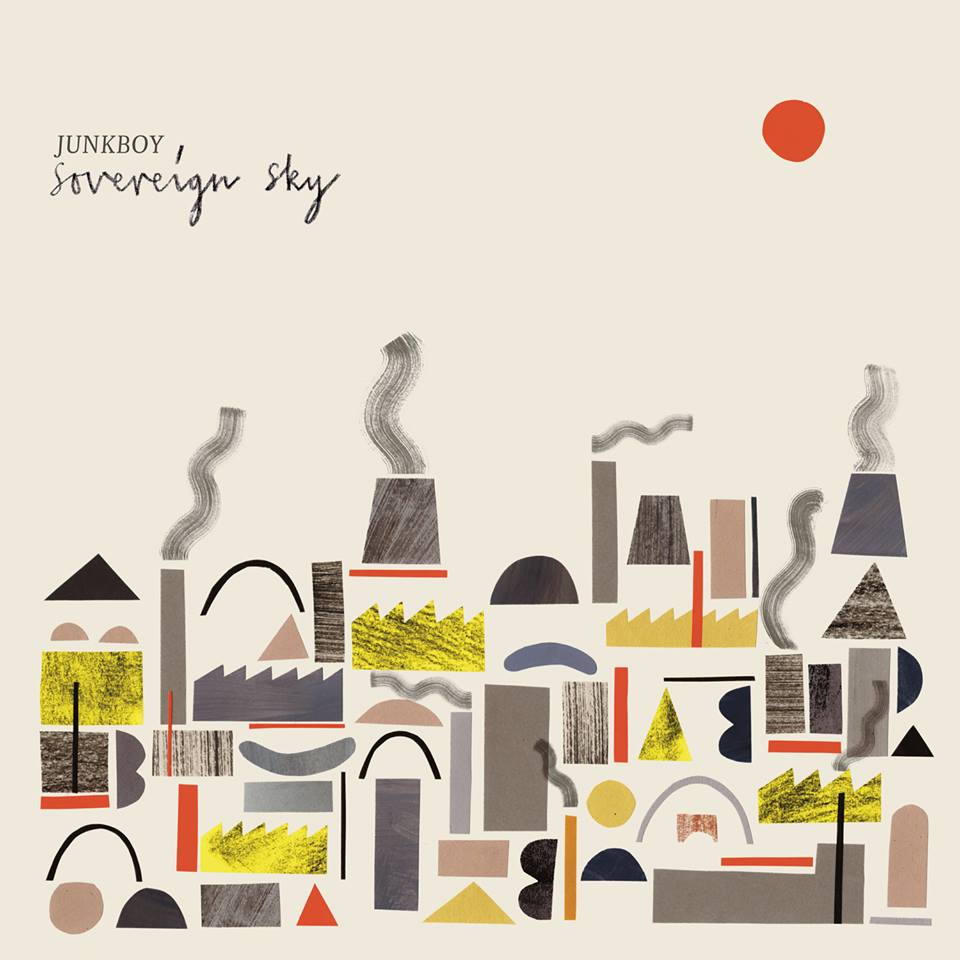Summer’s over. The seaside towns slip out of season, and the commuter trains up to London are full, while the holiday trains to the coast are increasingly empty. But sometimes the autumn clouds clear and the sunlight still dances on the waves; and the locals, those who live at the seaside all year round, can walk along the deserted, windswept promenade with a richer summer movie playing in their heads, tinged with loss and the memory of brighter days.
Junkboy are two brothers, Mik and Rich Hanscomb, who traded one English seaside town for another, moving many years ago from their native Southend-on-Sea to Brighton. Comparing the two places in the space of a record review would rely too much on misleading generalisations and perceived clichés, but I suspect that the Hanscomb brothers are happy anywhere within reach of a few good record shops and a shabby second-hand bookstall; and that, regardless, in their heads it’s Venice Beach in Los Angeles they’re walking along, Dennis Wilson’s blue Pacific Ocean superimposed over the grimy English Channel.
So Sovereign Sky, Junkboy’s first album since 2010’s Koyo, suggests the richly melodic, harmonised West Coast sunshine pop and folk rock of the Beach Boys and Love, but also Manfred Mann’s pastoral-urban, jazz-rock soundtrack to Up The Junction; melancholy, early 70s bedsit folkies like Duncan Browne and Brian Protheroe, and indie label dreamers and romantics from the Lilac Time to Shack, St Etienne to Mojave 3. It’s California sunshine and English rain; an imagined record, carefully constructed to summon a certain mood, poised on the cusp of ecstasy and sadness, everything shot in bittersweet soft focus.
Named after the large Southend park and garden (reportedly haunted by the monks who lived there in the 12th century), opening track ‘Priory Park’ is a Pentangle-like minute and a half of string-bending acoustic guitar, bass and splashing drums over birdsong and other field recordings. The more substantial ‘Redwood’ rolls in on a similarly tumbling, chiming rhythm, highlighted by sober violin and stinging electric lead guitar, while the soft vocals- near-whispered and wide-eyed- seem almost beside the point, offering texture and a hint of imagery (sunspots, leafy shade) but little more. The piano-led, California-yearning ballad ‘Release The Sunshine’ is in the tradition of Brian Wilson via the High Llamas, but with too-mortal voices straining to meet the ambitious chord progressions and harmony charts they’ve worked out for themselves. One could say that the occasional off-key moment gives a welcome humanity to songs that could otherwise seem too tightly reined in and carefully assembled; certainly the soft estuary vowels of ‘Salt Water’ lend a Marriot-esque edge to the otherwise bucolic, understated track. ‘Rainfalls’ is typical of Junkboy’s hybrid of folk, jazz and pop, glinting and cascading, suggesting lush orchestration with minimal means (cello, violin, 12-string guitar and hesitant harmonies), just as the impressionistic lyrics reinforce the sound picture rather than vice-versa.
Sovereign Sky is classicist but not conservative; quietly experimental, it goes its own way and keeps itself to itself, as uninterested in being seen as hip and cutting edge as it is in aspiring to fill arenas. The plaintive ‘Stormy Weather’ may be one of several songs that recall the gentler, more reflective moments of Britpop, usually found hidden away from the media glare on a Blur B-side or a Boo Radleys album interlude, but the awkward, near-formal dance of acoustic guitar and piano on ‘Amber Glow’ suggests a rhythmic link between courtly medieval jigs, King Crimson’s prog rock and contemporary R&B. Later, the instrumental ‘Belo Horizonte’ could have been plucked from a De Wolfe library album, labelled "Romantic montage theme: jazzy, upbeat, continental", and provides a rare opportunity for the electric guitar to let rip, though it remains, of course, tasteful and formally composed. The album’s longest track, closer ‘Water Wheel,’ even builds up to a full minute of climactic if restrained soloing, before fading back into birdsong and suburban murmurs.
And so Junkboy fade back into their out-of-season seaside town, boarding up the carousel and closing the miniature electric railway until spring. They leave behind an album of gentle reflection, like faded photographs of summer days; a sentimental keepsake, till it all comes round again.
<div class="fb-comments" data-href="http://thequietus.com/articles/16631-junkboy-sovereign-sky-review” data-width="550">


